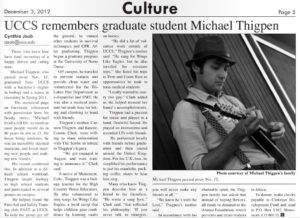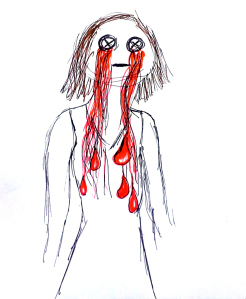Editorial Note: The following is reprinted with permission from Eleanor Skelton’s blog. It was originally published on October 6, 2014.
Continued from Part 3
You can get addicted to a certain kind of sadness
Like resignation to the end, always the end…
– Gotye, Somebody I Used To Know
October, it’s not your fault. But I really don’t like you anymore.
Depression hits me hardest in October and January. Summer’s buzz fades, and my dreams seem to die with it.
The past three autumns had a pretty dismal track record.
October 2011: My favorite high school English A Beka video teacher, Mrs. Sandy Schmuck, dies from a rare form of cancer.
September / October 2012: I call the campus police for a friend resuscitated from one suicide attempt who plummeted again.
A coroner’s report rules my musician friend Michael Thigpen‘s death a suicide. 
September / October 2013: Fellow classmate of five years, chemistry major, dies alone in his apartment.
A guy friend and I talk my friend Ashley out of a suicide attempt when her manipulative parents and cult Pentecostal church crushed her spirit.
September / October 2014: I’m in the ER with a friend whose self-harm went wrong.
American Evangelical Christianity has issues reconciling with mental illness. We took the “rejoice always” thing to mean “never, ever, ever let anyone know if you are depressed.” We forgot that we were also told to “bear one another’s burdens” and to “weep with those who weep.” That even Jesus wept.
“I’m in-right, out-right, up-right, down-right happy all the time, I’m in-right, out-right, up-right, down-right happy all the time, since Jesus Christ came in, and cleansed my heart from sin, I’m in-right, out-right, up-right, down-right happy all the time!”
One of the songs I grew up singing in A Beka elementary Bible video classes. My mom sometimes quoted it at me when I was grumpy.
So according to the song, if I’m truly a Christian, I can only be happy?
My friend MightiMidget described this so well in her post “Joy and Theology“:
“Then if joy is a command, and struggling with hopelessness is a sin, where am I allowed to feel? At all? Is struggling in itself a sin? Then apparently I am doomed to never get out of that cycle, and to ‘live in sin,’ and if I am ‘living in sin,’ does that mean I am not a believer and will never be able to truly achieve eternal life? Is it not meant for me? Am I not elect? God is Love, but is that Love then not for me, because I’m too emotional? Do I have to learn to not be emotional?”
I was always guilty if I wasn’t happy enough. As a teenager, my dad called me Eeyore when I was moody and told me to be more like Tigger. So I tucked my griefs deeper inside.
No wonder so many of my friends and I had a goth phase. At least there the darkness inside us gets recognized, as my friend Cynthia Jeub wrote about Christians and their attraction to goth culture.
I crashed last October. The waves of panic pulled me under, and the uncried sadness of more than a decade erupted.
 I couldn’t stop crying. I cried between every class, couldn’t focus on assignments and exams, took naps on the couch in our campus newspaper office and let the tears roll down.
I couldn’t stop crying. I cried between every class, couldn’t focus on assignments and exams, took naps on the couch in our campus newspaper office and let the tears roll down.
I got the flu, I dropped all my classes but one, and I slept for 15 to 18 hour periods for two weeks recovering from a sinus infection.
I’d hit a wall where I felt even I wasn’t worth fighting for anymore. My sleep-deprived mind and body demanded rest, and I finally gave in.
My Shakespeare professor and one of my Chemistry professors understood. Most of my professors and classmates didn’t.
My study buddy Racquel took me to the campus pub and bought me curly French fries, which we ate while I cried in her lap. Cynthia Jeub skipped out on part of our weekly student newspaper staff meeting with me and wiped my tears, coaxing me to eat. Josh took me out to Panda Express the day I got afraid of my own head again and debated theology with me at the coffee shop next door all evening.
My friend Aaron and his wife brought Starbucks to my apartment and told me it was okay to feel sad, it was even normal given my family background.
One afternoon while snuggled under my quilt feeling particularly crazy, I called my ever-traveling friend MOTS. She calmed my panic and told me not to stop the grief, to let it out. She said, “As my dad always tells me, ‘You can’t control emotions, all you can do is ride the waves.'”
This October I’m back at it again. Taking the same classes, facing the professors whose classes I dropped last year. I’m still fighting, and because I learned to endure even the sadness, I am stronger.
Maybe I won’t always hate October. Maybe I won’t always keep needing to grieve.
Some autumn nights I still recite one of the poems we memorized in Mrs. Schmuck’s ninth grade English class:
A Vagabond Song
Bliss Carman
There is something in the autumn that is native to my blood—
Touch of manner, hint of mood;
And my heart is like a rhyme,
With the yellow and the purple and the crimson keeping time.
The scarlet of the maples can shake me like a cry
Of bugles going by.
And my lonely spirit thrills
To see the frosty asters like a smoke upon the hills.
There is something in October sets the gypsy blood astir;
We must rise and follow her,
When from every hill of flame
She calls and calls each vagabond by name.
My final post will be about the importance of emotional honesty.











 I couldn’t stop crying. I cried between every class, couldn’t focus on assignments and exams, took naps on the couch in our campus newspaper office and let the tears roll down.
I couldn’t stop crying. I cried between every class, couldn’t focus on assignments and exams, took naps on the couch in our campus newspaper office and let the tears roll down.

